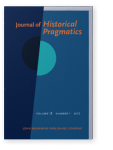The pragmatics of grand in Irish English
Over the past two centuries, the use of the adjective grand underwent a specific semantic expansion in Irish English. Apart from the meaning of ‘displaying grandeur’, the adjective came to mean ‘fine’, ‘alright’ and ‘in good form’, both as an expression of the speaker’s situation and as a reference to that of the addressee. This development can be shown to represent a case of subjectification, as described seminally by Elizabeth Traugott in various publications (e.g., Traugott 1995), with the element of intersubjectification arising somewhat later (Traugott 2003). Through the examination of various texts, this paper examines the diachronic development of grand in its various uses and the rise of the Irish English extension with a consideration of possible precursors and parallels in other varieties. The subjective and intersubjective uses of grand are labelled “approving grand” and “reassuring grand” respectively and are shown to be in keeping with other features of Irish discourse structure and pragmatics.
Article outline
- 1.Introduction
- 2.The diachrony of grand
- 3.The transition from “impressive grand” to “approving grand”
- 3.1The role of collocations in the development of grand
- 3.2Negative uses of grand
- 3.3Use of qualifiers with grand
- 4.Extension of syntactic contexts
- 5.Uses of grand today
- 5.1Distribution within Ireland
- 5.2Possible occurrences of “approving grand” beyond Ireland
- 5.2.1Occurrences of grand in British English
- 5.2.2Definitions of grand in dictionaries
- 5.3Intersubjectification: From “approving grand” to “reassuring grand”
- 6.Conclusion
- Acknowledgements
- Notes
-
Sources
-
References
This article is currently available as a sample article.
References
Sources
American Heritage Dictionary of the English Language
2000/2009 Fourth edition. Boston: Houghton Mifflin Company.

Cambridge Advanced Learner Dictionary
2013 (Fourth edition.) Cambridge: Cambridge University Press.

Merriam Webster 11th Collegiate Dictionary
2003 (Third edition.) Springfield, Massachesetts: Merriam Webster.

Oxford English Dictionary
Second edition 2009 [1989])
CD-Rom Version 3.0. Oxford: Oxford, digitally enhanced version University Press.
Amador-Moreno, Carolina, Elaine Vaughan and Kevin McCafferty
Barron, Anne and Klaus P. Schneider
2005 “
Irish English: A Focus on Language in Action”. In
Anne Barron and
Klaus P. Schneider (eds),
The Pragmatics of Irish English, 3–16. Berlin: Mouton de Gruyter.


Barron, Anne and Klaus P. Schneider
(eds) 2005 The Pragmatics of Irish English. Berlin: Mouton de Gruyter.


Benveniste, Emile
1971 [1958] “
Subjectivity in language”. In
Mary Elizabeth Meek (trans),
Problems in General Linguistics, 223–230. Coral Gables: FL: University of Miami Press. (Originally published in 1958 as “De la subjectivité dans le langage”. In Problèmes de Linguistique Générale. Paris: Gallimard, 258–266.)

Cheshire, Jenny
1996 “
Syntactic Variation and the Concept of Prominence”. In
Juhani Klemola,
Merja Kytö and
Matti Rissanen (eds),
Speech Past and Present: Studies in English Dialectology in Memory of Ossi Ihalainen, 1–17. Bern: Peter Lang.

Clancy, Brian and Elaine Vaughan
Defour, Tine
2010 “
The Semantic – Pragmatic Development of well from the Viewpoint of (Inter)Subjectification”. In
Kristin Davidse,
Lieven Vandelanotte and
Hubert Cuyckens (eds),
Subjectification, Intersubjectification and Grammaticalization, 155–196. Berlin: de Gruyter Mouton.


Flynn, Tara
2014 You’re Grand – The Irishwoman’s Secret Guide to Life. Dublin: Hachette Books Ireland.

Hickey, Raymond
2007 Irish English: Its History and Present-day Forms. Cambridge: Cambridge University Press.


Jucker, Andreas H. and Irma Taavitsainen
2013 English Historical Pragmatics. Edinburgh: Edinburgh University Press.

Kirk, John M. and Jeffrey L. Kallen
2008 ICE-Ireland: A User’s Guide. Belfast: Cló Ollscoil na Banríona.

Kytö, Merja, Mats Rydén and Erik Smitterberg
(eds) 2006 Nineteenth-Century English: Stability and Change. Cambridge: Cambridge University Press.


Leitner, Gerhard
1991 “
English as a Pluricentric Language”. In
Michael G. Clyne (ed.),
Pluricentric Languages: Differing Norms in Different Nations, 179–238. Berlin: Mouton de Gruyter.


McCafferty, Kevin and Carolina P. Amador Moreno
2013 “
A Corpus of Irish English Correspondence (CORIECOR): A Tool for Studying the History and Evolution of Irish English”. In
Bettina Migge and
Máire Ní Chiosáin (eds),
New Perspectives on Irish English, 265–288. Amsterdam: John Benjamins.

Ó Curnáin, Brian
2012 “
An Ghaeilge iarthraidisiúnta agus an phragmataic chódmeasctha thiar agus theas” [Post-traditional Irish and the pragmatics of code-switching in the west and south]. In
Ciarán Lenoach,
Conchúr Ó Giollagáin and
Brian Ó Curnáin (eds),
An Chonair Chaoch. An Mionteangachas sa Dátheangachas [
The Blind Path. Minority Languages in Bilingual Environments], 284–364. Inverin, Co. Galway: Leabhar Breac.

Schiffrin, Deborah
1990 “
The Principle of Intersubjectivity in Communication and Conversation”.
Semiotica 801: 121–151.

Schneider, Gerold
2013 “
Investigating Irish English with ICE Ireland”. In
Patricia Ronan (ed.),
Ireland and its Contacts – L’Irlande et ses contacts, 137–162. Université de Lausanne: Centre Linguistique es des Sciences du Language.

Schneider, Klaus P. and Anne Barron
Thompson, R. W.
1991 “
Spanish as a Pluricentric Language”. In
Michael G. Clyne (ed.),
Pluricentric Languages: Differing Norms in Different Nations, 45–70. Berlin: Mouton de Gruyter.


Traugott, Elizabeth Closs
1989 “
On the Rise of Epistemic Meanings in English: An Example of Subjectification in Semantic Change”,
Language 571: 33–65.

Traugott, Elizabeth Closs
1995 “
Subjectification in Grammaticalization”. In
Dieter Stein and
Susan Wright (eds),
Subjectivity and Subjectivisation in Language, 31–54. Cambridge: Cambridge University Press.


Traugott, Elizabeth Closs
2003 “
From Subjectification to Intersubjectification”. In
Raymond Hickey (ed.),
Motives for Language Change, 124–142. Cambridge: Cambridge University Press.


Traugott, Elizabeth Closs
2010 “
(Inter)subjectivity and (inter)subjectification: A Reassessment”. In
Kristin Davidse,
Lieven Vandelanotte and
Hubert Cuyckens (eds),
Subjectification, Intersubjectification and Grammaticalization, 29–71. Berlin: de Gruyter Mouton.


Vaughan, Elaine and Brian Clancy
2011 “
The Pragmatics of Irish English”. In
Raymond Hickey (ed.),
Irish English in Today’s World (Special issue of
English Today
), 47–52. (Volume 1061.) June 2011.

Cited by
Cited by 3 other publications
Ní Mhurchú, Aoife
2018.
What’s Left to Say About Irish English Progressives? “I’m Not Going Having Any Conversation with You”.
Corpus Pragmatics 2:3
► pp. 289 ff.

This list is based on CrossRef data as of 2 june 2024. Please note that it may not be complete. Sources presented here have been supplied by the respective publishers.
Any errors therein should be reported to them.
